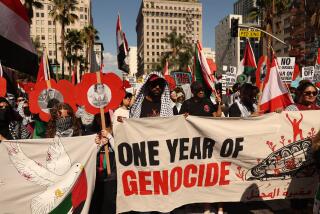Ethiopia, Eritrea Families in Southland Agonize Over War
- Share via
As intense fighting rages half a world away between Eritreans and Ethiopians, local friends and family of those involved watch in anguish.
Immigrants from the Horn of Africa nations living in Los Angeles suffer with each new revelation of the disaster in their homelands. They debate the fine points of the war. Some build bonds and make enemies over the conflict.
Most of all, they pray.
“It is every day an agony,” said Elias Wondimu, managing editor of the Ethiopian Review, a Los Angeles-based bimonthly magazine.
“I see the future, and the future really scares me.”
Los Angeles County is home to about 50,000 Ethiopians and Eritreans, the largest concentration in the country after Washington, D.C. Like many other immigrants, they are intimately tied to home.
The conflict intensified in 1998, five years after Ethiopia granted Eritrea independence after decades of fighting. But questions about borders and shared assets remained--and fueled conflict.
Deaths are estimated in the tens of thousands, and more than a million people have become refugees, fleeing into neighboring countries scarcely capable of lending a hand.
In Los Angeles, a peace rally will be held Saturday at 11 a.m. outside the Federal Building on Wilshire Boulevard, the fourth such rally in two years.
“We are calling on all well-meaning Africans to join the rally and think of making a possible contribution to peace in Africa,” said Nikki Azebe Tesfai, an organizer and Eritrean refugee worker.
For Tesfai, the rally will be about more than lip service.
She was born and raised--and still has family--in Asmara, Eritrea, where Ethiopian bombs this weekend destroyed a military airstrip.
“They may be dying there,” she said, her eyes clouding. “They are in danger.”
She quickly added, “But this isn’t about me or my family. I’m worried today that we’re going to see another genocide like Rwanda. This is a humanitarian issue.” Tesfai, who is executive director for the African Community Resource Center, admitted she has little hope that the ongoing Ethiopian-Eritrean negotiations would bring peace. There is, she said, little to enforce an agreement.
Tesfai and others were frustrated that the war has been portrayed as a simple battle over a disputed 420-mile stretch of border between the neighboring countries.
This war, they said, is like most: It is largely fueled by a scramble for economic and political power.
“If there were food and potable water and good education, there would be no fighting,” said Wale A. Jimoh, a Nigerian member of the Federation of African Assns., a local African advocacy group.
“It would be a lot cheaper for the leaders of these countries to take the proper steps than to wage war.”
In a land suffering a severe, three-year-old famine that has brought millions to the brink of starvation, the effects have been devastating for everyday people, said Berhanu Asfaw, co-owner of Messob, an Ethiopian restaurant on Fairfax Boulevard.
“There are so many problems,” he said. “Hunger, lack of development, the need for infrastructure. There are more things to worry about than fighting. What [the politicians] do,” he added, “is not what the people want.”
Most admitted that they were not surprised at the recent spate of violence, but they bemoaned the lack of attention from Western countries to the problem over the years.
“Actually I was surprised to see the attention in the news media the last three or four days,” Asfaw said. “It’s very frustrating that the concern is not there. If people knew what was going on, I think they would do something about it.”
More to Read
Sign up for Essential California
The most important California stories and recommendations in your inbox every morning.
You may occasionally receive promotional content from the Los Angeles Times.










